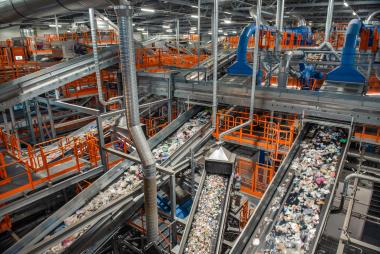New recycling sorting facility to process 80% of Norway's plastic waste
A new chapter for circular plastics in Europe began November, 5 with the official opening of Områ, Norway’s new national facility for sorting all types of plastic packaging waste—including plastic that previously had no other option than to go to incineration.
Jointly owned by TOMRA (65%) and Plastretur (35%), the state-of-the-art facility has the capacity to process 90,000 tonnes of plastic per year, transforming plastic packaging waste into uniform polymer fractions ready for recycling.
Områ uses advanced sensor-based technology to sort mixed plastic waste into ten separate monofractions— including polyethylene (PE), polypropylene (PP), polyethylene terephthalate (PET), polystyrene (PS), and others — enabling improved recovery and increased recycling rates. This innovation closes the loop for plastics and represents one of the most advanced installations of its kind globally.
“Områ is more than a facility — it’s a missing link in Europe’s circular economy,” said Tove Andersen, President and CEO of TOMRA. “This facility has the capacity to receive and transform all of Norway’s household plastic packaging waste into recyclable fractions, essentially closing the loop for plastics. It is a cornerstone piece of infrastructure providing reliable offtake for mixed waste sorting facilities, and can help recover more resources from source separated material.”
The new facility, located at Holtskogen, just outside Oslo, will serve as a reliable offtake solution for municipalities and waste management companies considering the introduction of automated mixed waste sorting (MWS), a crucial step for increasing recycling rates without depending solely on household source separation.
By 2030 the EU requires minimum 55% of plastic packaging waste to be recycled (i.e., collected and recycled at scale) under the forthcoming PPWR. Today, approximately one-third of Norway’s plastic packaging waste is recycled; the rest is mostly incinerated.
“Områ gives municipalities and the entire value chain a clear signal: there is now a scalable, high-quality route for plastic packaging,” said Karl Johan Ingvaldsen, CEO of Plastretur. “It provides the infrastructure needed to meet EU recycling targets and supports our shared ambition to build a truly circular plastics economy.”
About Områ
Områ is a joint venture between TOMRA Systems ASA (65%) and Plastretur AS (35%), established to develop and operate Norway’s first national fine-sorting facility for plastic packaging waste. The facility is located at Holtskogen, approx. 45 min outside Oslo, and has an annual processing capacity of 90,000 tonnes. Using TOMRA’s world-leading sensor-based sorting technology, Områ separates mixed plastic streams into up to ten distinct polymer fractions for high-value recycling.
Områ



























